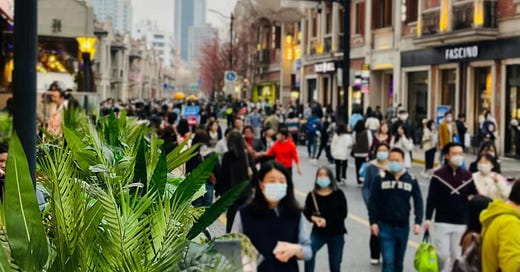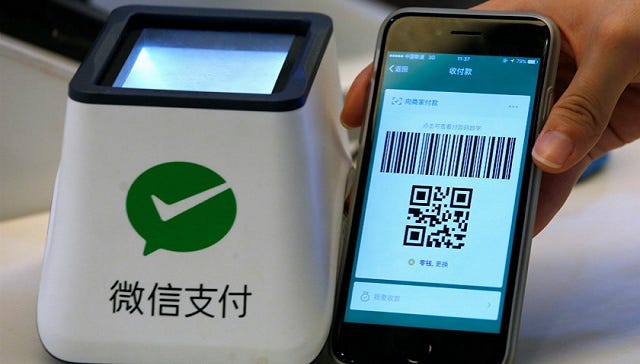This is the fourth post in my Social Observation Series, following my reflections on:
#1 Thoughts on China's Stringent Regulations on the Tutoring Industry
#2 The Tea House around the Corner
Dear readers. I hope you are all doing well! I apologize for my recent absence, as I have been spending some time with my family during the Spring Festival and traveling on the road.
In February and March, I traveled throughtout China for three weeks, visiting both first-tier cities (Beijing, Shanghai, Shenzhen, Guangzhou) and lower-tier cities along the coast and inland.
In this travelogue, I would like to share with you my latest observations during this China trip in four parts:
Ordinary People’s Life in the Post-Pandemic Era
Business Owners in the Post-Pandemic Era
A Discussion on AIGC and ChatGPT with Friends
Mobile Payments: A Different Perspective
Concluding thoughts
Ordinary People’s Life in the Post-Pandemic Era
For most people, the pandemic is a thing of the past.
During conversations with friends who have lived in Beijing and Shanghai for the past three years, I found that everyone seemed to have forgotten about the pandemic and returned to their normal life. When I consciously brought up the topic, their reaction was as if it happened ten years ago, and life goes on.
This was surprising to me at the very beginning, but after a second thought, it makes sense - In the lengthy history of human evolution, it is likely that those sensitive and melancholic branches, who wallowed in past pains, have long been eliminated by natural selection. Choosing not to actively recall painful or heartbreaking memories may, in fact, be an advantageous trait that has been selected for over the course of millions of years of evolution, perhaps even ingrained in our very nature as humans.
On the other hand, analyzing the recovery of demand, I see that daily needs, including essential needs and the recovery of travel after three years of pandemic suppression, are doing well. However, when it comes to large expenditures such as buying houses and autos, in my conversations with consumers, real estate agents, and auto salespeople, I could feel the caution of consumers, which is essentially due to the lack of confidence in their future cash flow caused by the three-year pandemic.
Business Owners in the Post-Pandemic Era
Different industries will see variations in their recovery from the pandemic. For instance, hotels may recover faster with domestic travel, but for the majority of business owners who have experienced multiple shutdowns, layoffs, logistics issues (such as production completed during lockdown periods but unable to be transported), and payment collection problems over the past three years, investment in capital expenditure is approached with greater caution. The most obvious areas for investment, recruitment, and expanding production are handled with more prudence. For these to improve, several factors need to be monitored, which include increased confidence in consumer and business sentiment, more active policy support, and a gradual recovery throughout the entire supply chain.
On the other hand, I am also impressed by the resilience of entrepreneurs on this land. For many manufacturing business owners, facing lockdowns meant leading their employees to live in the factories, to a certain extent ensuring that production continued. This also meant being separated from their families for extended periods of up to six months during the most difficult times. I have heard many admirable stories, and I believe that the business owners who have survived these three years of adversity demonstrate the tenaciousness and entrepreneurship of business owners on this land.
A Discussion on AIGC and ChatGPT with Friends
This was the topic that came up most frequently in my conversations with friends in TMT space and venture capital space in China. Everyone is closely following the progress of new technologies such as GPT4, and here are some key takeaways:
The long-term impact of GPT has the potential to rival that of the iPhone, though it has yet to reach the defining stage such as iPhone 4 (As the saying goes, the iPhone redefined the phone, and the iPhone 4 redefined the iPhone).
From a product standpoint, clear use cases already exist for both toB and toC markets.
Ethically speaking, human history has been a gradual process of diminishing intelligence as a result of human laziness. It is foreseeable that if new technologies are not properly regulated, they may accelerate this trend.
Nevertheless, new technologies can also help humans improve more quickly. A case in point - Following AlphaGo's defeat of the top human Go player in 2016, many predicted that human Go player would soon be replaced. However, subsequent developments in human Go player have not only prevented this from happening, but have given the game new life for those who actively embrace new technologies. Recently, scholars from Yale and the City University of Hong Kong published an article on March 13th, prior to the release of GPT4, titled "Superhuman Artificial Intelligence Can Improve Human Decision-Making by Increasing Novelty", which analyzed human Go players' strategy evolvement since 2016. They found that after 2016, human Go players were no longer bound by traditional thinking, making more original moves and exhibiting greater randomness and unpredictability. AlphaGo accelerated the improvement and liberation of human Go players' skills.
In my opinion, the key to improving how technology serves humanity lies in two aspects: First, actively embracing technology. While some schools prohibit students from using ChatGPT, a professor at Hong Kong University of Science and Technology encourages his students to use ChatGPT to complete reports and rewards them with extra credit. On the other hand, technological advancements have enabled problem solvers to efficiently complete execution steps, reducing the need for human resources to engage in ineffective work and transforming some problem solvers into problem creators. The importance of the core skill of finding the right problem is once again emphasized.
Finally, the development of Chinese domestic players in related technologies will be bumpy in my view. On the one hand, there is still a gap in software that requires time to address. On the other hand, at the more fundamental chip level, restrictions on chip imports and the gap in self-developed chips will present greater challenges for software iteration, commercialization, and implementation.
Mobile Payments: A Different Perspective
As someone who has experienced the rapid development of mobile payments in China, everything seems natural to me. However, when I recently traveled with an American friend who does not use WeChat Pay, Alipay, Meituan, or Didi, his painful experience (e.g. When using cash, people cast strange glances at you - It's like you just whipped out a relic from a bygone era!) made me realize how ubiquitous mobile payments and online services have become in China, representing the current way of life for people living here.
The extreme convenience also brings other issues, such as information security, and more practically, if you lose your phone while traveling to other cities, you may find yourself completely helpless.
I suggest that you experience it yourself, preferably with the accompaniment of a local friend.
Concluding thoughts
I have been asked about my views on the recovery of Chinese economy during my trips this year. I rely on my year-end summary from last year - "Human society has short memories, but the changed habits and mindset last."
I would like to add another sentence this time: "We always overestimate the change that will occur in the next two years and underestimate the change that will occur in the next ten."
As the ancient Chinese poem goes, "纸上得来终觉浅 绝知此事要躬行 / What I hear, I forget. What I see, I remember. What I do, I understand." I invite you to come and see this part of the world for yourself.
Thanks for your reading and I hope you enjoy it. Stay safe and see you next time.
ChatGPT also contributed to this article.





